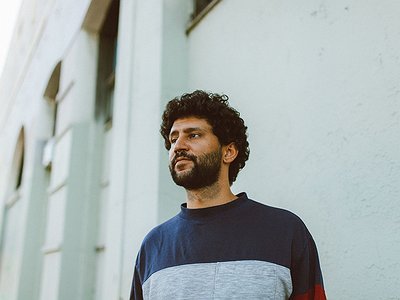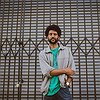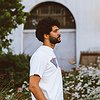Name: Kiefer Shackelford aka Kiefer
Nationality: American
Occupation: Pianist, producer, composer
Current release: Kiefer's new album It's OK, B U is out via Stones Throw.
Recommendations: The best music book I’ve ever read was Miles Davis’ autobiography - I read it in 8th grade and it made me fall in love with the history of Black American Music and its greatest practitioners.
My other favorite music book is Herbie Hancock’s autobiography, Possibilities.
If you enjoyed this Kiefer interview and would like to keep up to date with his music, visit his official homepage. He is also on Instagram, Facebook, and twitter. There is also a Kiefer artist page on the website of his label, Stones Throw.
When I listen to music, I see shapes, objects and colours. What happens in your body when you're listening? Do you listen with your eyes open or closed?
Listening to music doesn’t really evoke other senses for me - at an earlier time in my life I used to intentionally do synesthesia exercises and I would have other sensory associations, but ultimately, I abandoned that approach.
That said, sometimes I reminisce, sometimes I think about what’s for dinner, sometimes I study the groove and try to copy it exactly by beatboxing along, sometimes I’m at a party and time talking to friends, sometimes I’m in a faraway country and enjoying local food, sometimes I focus on and learn the chord changes.
Music is all day every day, so at this point I’ve enjoyed it countless different ways.
What were your very first steps in music like and how would you rate the gains made through experience - can one train/learn being an artist?
I started playing piano at the age of 3 or 4 - my dad plays piano every day, and my mom taught each of the kids in the family how to read music and begin playing.
I got good at music when I started practicing more and studying with great teachers - I made my biggest leaps at the ages of 8, 15, 19, 24, and 31, all when I ramped up my practice and fine-tuned my regimen with my teachers. I am of the belief that anyone can learn how to play music well, barring some learning difference.
Sadly, I think music education in America, with few exceptions, is not very good. Society’s view on music and the process of learning it is mostly shaped by non-musicians and there’s a lot of misunderstandings of how it can be learned.
According to scientific studies, we make our deepest and most incisive musical experiences between the ages of 13-16. What did music mean to you at that age and what’s changed since then?
When I was in my early teens, I was blown away by a transcription of a John Coltrane solo where he was playing with such incredible speed and facility while every single note corresponded to the “correct” scale of each chord.
At that age I was just truly in awe of great musicians themselves, and revered musicianship in general. Miles Davis, Oscar Peterson, Stevie Wonder, Herbie Hancock, they were heroes to me.
What, would you say, are the key ideas behind your approach to music and what motivates you to create?
For me, music is, in cognitive and practical terms, a language. I use it to describe emotional aesthetics which spoken language cannot.
However, like spoken language, music is not something that I’m necessarily “motivated” to use, but rather, something I am compelled to use. Spoken language and music are both something I must use, to communicate, to connect and socialize with people, to journal, to organize and express my thoughts.
For me, music is something I simply couldn’t not do. I do not aspire to stop using spoken language, as I do not plan to stop making music. 95% of the people I know are musicians. Music is the way I talk, the way I dress, the way I hang out and connect with people. When I’m alone I make music to understand myself. When I’m with friends, who almost all are musicians, I make, listen, and talk about music to hang out, to get better at it, to laugh, to have a good time, and because it’s a gig and I have to do it sometimes.
Sometimes I don’t like making it, but it’s just what I do. Something it’s like brushing my teeth and it’s just a mundane task I must do. It is all I do, even when I’m not doing it, and it’s stuck in my head. I am not motivated to do it.
To quote a question by the great Bruce Duffie: When you come up with a musical idea, have you created the idea or have you discovered the idea?
As far as discovering musical ideas or creating them, I don’t know!
Is there a difference? What constitutes a musical idea? What is music? 
Kiefer Interview Image by Preston Groff
Paul Simon said “the way that I listen to my own records is not for the chords or the lyrics - my first impression is of the overall sound.” What's your own take on that and how would you define your personal sound?
I agree with Paul Simon. Sound is first and foremost. Chords, notes, rhythms - this is metadata. Sound is more fundamental to me.
For me, my aim in making records thus far has been to journal - to record sounds that sound like how I’m feeling, specifically in ways that spoken language cannot.
Sound, song, and rhythm are all around us, from animal noises to the waves of the ocean. What, if any, are some of the most moving experiences you've had with these non-human-made sounds? In how far would you describe them as “musical”?
I love the sound of the ocean. Being from San Diego, hearing the sound of the ocean as I went to sleep every night was something I was very familiar with growing up. I wouldn’t describe this sound as musical - I think music requires intent. Meaning, if I recorded the ocean and then called this recording ‘music’, thus invoking intent, it would then be music.
That said, sounds do not have to be “musical” to be as beautiful or profound as music. Then again, music, after all, is just a word, and we can define it however we want.
From very deep/high/loud/quiet sounds to very long/short/simple/complex compositions - are there extremes in music you feel drawn to and what response do they elicit?
I don’t know - I like it all, to be honest. I like simple, I like complex, but I don’t like any one particular thing. I like range.
My piano teacher taught me when I was very young that forte is only loud if you play really quietly at another point in the piece. It’s all relative. Complex is only complex in comparison to simplicity. I like to have both complex and simple elements in the course of an album.
Some songs have piano solos, some have none. Some songs are out, some songs are harmonically very simple. I like range.
Could you describe your creative process on the basis of one of your pieces, live performances or albums that's particularly dear to you, please?
My creative process is a long-term process that takes many years. I write a few musical ideas every day, and each year, when I make an album, I have some hundreds of ideas to choose from that year, and a thousand more from recent past years.
I then pick a dozen or so that create a compelling and cohesive (or not!) story and think about how I want to put it together. Then I continue writing and finish them all. This process takes about a month.
Each of my albums have been created this way, all addressing unique moments, memories, and emotional aesthetics specific to the time periods they were created in.
Do you conduct “experiments” or make use of scientific insights when you're making music?
Certainly in the world of mixing and sound design there are a lot of scientific concepts that could be involved - Harmonics and different frequency ranges / loudness vs. perceived loudness, resonance, all these things come into play.
Experimenting with these can be scientific in a sense, though I don’t think of it that way. 
Kiefer Interview Image by Preston Groff
How does the way you make music reflect the way you live your life? Can we learn lessons about life by understanding music on a deeper level?
Music to me, amongst many other things, is a language - it is not a literal language with explicit meanings for anything, but it is a means to express. I use music to express things, describe things, connect and socialize with people.
I think there are many lessons in music, but music is a symptom of the process of someone making it - therefore, we have a lot of lessons to learn from musicians, through their music.
Music is just a conduit for me. It is a result of what people make.
Do you feel as though writing or performing a piece of music is inherently different from something like making a great cup of coffee? What do you express through music that you couldn't or wouldn't in more 'mundane' tasks?
Making music and making coffee have a lot in common in terms of how to get good at it. Both require practice, a knowledge base acquired from people who did it before you - and above all, a ton of passion and desire consistently over a long period of time to do a good job at it. Then at some point, it becomes part of your identity that you love to do it and you don’t have to motivate yourself to do it.
And that’s the difference between music and more “mundane” tasks - the more “mundane” tasks aren’t a part of my identity. With music I can show you who I am. I can’t show you as much of who I am with how I drive a car. But a race car driver probably could.
Every time I listen to "Albedo 0.39" by Vangelis, I choke up. But the lyrics are made up of nothing but numbers and values. Do you, too, have a song or piece of music that affects you in a way that you can't explain?
Yes, of course. There are hundreds. Off top, “Sanfona” by Egberto Gismonti does this for me.
If you could make a wish for the future – what are developments in music you would like to see and hear?
I think it’d be great if more people played music and understood it a little better. It’s incredibly fun, making music.
I wish musicians themselves were understood a little better. People see musicians playing in bars and always assume they’re amateurs or doing it for fun. Even sometimes when they’re world class players. I wish people had more respect for musicians.
I wish musicians who are trying to find their way had an easier time figuring it out. I wish musicians didn’t have to feel dark or depressed about making their way in the industry. I want musicians to feel good about developing, and not feel discouraged, or that they can’t do it.
I believe music is something anyone can learn to do, and anyone can get better at it, at any point in their lives.






